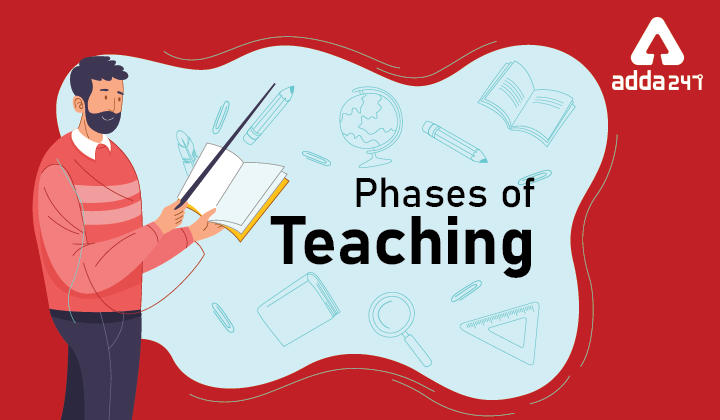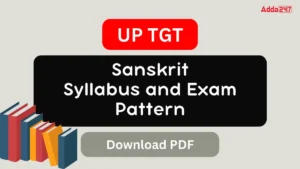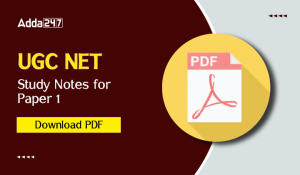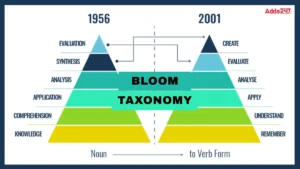Table of Contents
Phases of Teaching – Stages of the Teaching Process are an important topic of Child Development and Pedagogy (CDP) which comes in teaching exams i.e. UGC NET, CTET, HTET, KVS and others. Here, we are going to explain the Phases and Stages of Teaching in detail which helps students with Exam Preparation.
Phases of Teaching – Stages of Teaching Process in Hindi: Phases of Teaching are the process of teaching. Stages of teaching are the main step to follow the teaching process. Teaching is a complex task and to perform this process, systematic planning is needed. Good planning makes teaching successful.
Phases of Teaching
Phases of Teaching are the process of teaching. Teaching is to be considered in terms of various steps and the different steps constituting the process are called the phases of teaching. Jackson thinks that if we are to obtain a complete description of the teaching activity based on phrases of teaching , we must consider what the teacher does before and after his regular teaching in the class, Jackson divides the teaching act into three phases of teaching as shown below:
शिक्षण एक जटिल कार्य है। इस कार्य को करने के लिए, एक व्यवस्थित योजना की आवश्यकता है। शिक्षण को विभिन्न चरणों के संदर्भ में माना जाता है और प्रक्रिया को बनाने वाले विभिन्न चरणों को शिक्षण का चरण कहा जाता है जैक्सन का मानना है कि यदि हमें शिक्षण गतिविधि का पूरा विवरण प्राप्त करना है, तो हमें यह विचार करना चाहिए कि शिक्षक कक्षा में नियमित शिक्षण के पहले और बाद में क्या करता है। जैक्सन ने शिक्षण कार्य को शिक्षण के तीन चरणों में विभाजित किया है:
3 Phases of Teaching
Phases of teaching can also be explained as under:
शिक्षण के चरणों को भी निम्न के रूप में समझाया जा सकता है:
 Pre-Active Stage
Pre-Active Stage
The teacher at this Pre active stage hypothesis about the possible outcome of his action. As the teacher decides what textbooks to use or how to group the children for reading or whether to notify student’s parents of their poor performance
पहले से सक्रिय चरण
इस स्तर पर शिक्षक अपनी कार्रवाई के संभावित परिणाम के बारे में परिकल्पना करते हैं। जैसा कि शिक्षक यह तय करता है कि पढ़ने के लिए बच्चों को किस पाठ्यपुस्तक का उपयोग करना है या कैसे समूह बनाना है या अपने खराब प्रदर्शन के बारे में छात्र के माता-पिता को सूचित करना है या नहीं.
Following operations or substages are involved
निम्नलिखित ऑपरेशन या विकल्प शामिल हैं:-
(a) Forming of fixing up goals.
लक्ष्य तय करने का गठन।
(b) Taking decisions about the content.
सामग्री के बारे में निर्णय लेना।
(c) Managing or sequencing appropriate means and ways of presentation.
उचित साधन और प्रस्तुति के तरीके का प्रबंधन या अनुक्रमण।
(d) Deciding about appropriate strategies and tactics of teaching.
शिक्षण की उपयुक्त रणनीति और रणनीति के बारे में निर्णय लेना।
(e) Developing teaching strategies for the specific subject matter
विशिष्ट विषय वस्तु के लिए शिक्षण रणनीति विकसित करना।
Inter Active stage
Inter-active stage is actual classroom teaching. At Inter-active stage the teacher uses a number of strategies for achieving the goals already set, in the inter-active setting.
अंतर-सक्रिय चरण
यह वास्तविक कक्षा शिक्षण है। इस स्तर पर शिक्षक अंतर-सक्रिय सेटिंग में पहले से निर्धारित लक्ष्यों को प्राप्त करने के लिए कई रणनीतियों का उपयोग करता है।
The task of keeping pupils involved may entail explanation, demonstration definition, and other logical operations that have come to be thought of as the heart of teaching
विद्यार्थियों को शामिल रखने का कार्य स्पष्टीकरण, प्रदर्शन परिभाषा और अन्य तार्किक परिचालनों को शामिल कर सकता है, जिन्हें शिक्षण के दिल के रूप में माना जाता है.
संवादात्मक चरण के संचालन या उप-चरण: शिक्षण के अंतर-सक्रिय चरण में निम्नलिखित शामिल हैं:
(a) Perceiving the size of the class by the teacher to identify students.
छात्रों की पहचान करने के लिए शिक्षक द्वारा कक्षा के आकार को समझना।
(b) Diagnosing the achievements of the learners
शिक्षार्थियों की उपलब्धियों का निदान करना
(c) Action or Achievement (Initiation or Response) this involves the following operations:
कार्रवाई या उपलब्धि (आरंभ या प्रतिक्रिया) इसमें निम्नलिखित कार्य शामिल हैं:
- Selection of stimuli उत्तेजनाओं का चयन
- Presentation of the Stimuli स्टिमुली की प्रस्तुति
- Feedback of reinforcement सुदृढीकरण की प्रतिक्रिया
- Development of strategies of teaching शिक्षण की रणनीतियों का विकास
Post-Active Stage
The post active stage concerning evaluation provides necessary feedback to the teacher and the students in bringing desirable improvement in their performance. It is related with both teaching and learning.
उत्तर-सक्रिय चरण
मूल्यांकन से संबंधित पोस्ट सक्रिय चरण शिक्षक और छात्रों को उनके प्रदर्शन में वांछनीय सुधार लाने के लिए आवश्यक प्रतिक्रिया प्रदान करता है। यह शिक्षण और अधिगम दोनों से संबंधित है
The teacher analyses as to what extent the student have grasped the material presented to them. It is in fact the assessment of the interactive process. It helps the teacher to teach things better in future. It also helps the students to learn things better. It enables the teacher to decide whether he should proceed with the new contents or reteach. What has already been taught.
शिक्षक इस बात का विश्लेषण करता है कि छात्र ने उन्हें किस हद तक सामग्री प्रस्तुत की है। यह वास्तव में इंटरैक्टिव प्रक्रिया का मूल्यांकन है। यह शिक्षक को भविष्य में चीजों को बेहतर ढंग से सिखाने में मदद करता है। यह छात्रों को बेहतर चीजें सीखने में भी मदद करता है। यह शिक्षक को यह तय करने में सक्षम बनाता है कि उसे नई सामग्री या रीचेक के साथ आगे बढ़ना चाहिए। जो पहले ही सिखाया जा चुका है
In short, following operations are involved at the post active stage:
संक्षेप में, उत्तर- सक्रिय चरण में निम्नलिखित ऑपरेशन शामिल हैं:
(a) Assessing the suitability of the objectives determined.
निर्धारित उद्देश्यों की उपयुक्तता का आकलन करना।
(b) Deciding regarding reteaching the content or further taking up the contents.
सामग्री को पुनः प्राप्त करने या आगे सामग्री लेने के बारे में निर्णय लेना।
(c) Assessing the suitability of the instructional material and aids.
निर्देशात्मक सामग्री और सहायता की उपयुक्तता का आकलन करना।
(d) Assessing the impact of the classroom environment and effecting desired changes.
कक्षा के वातावरण के प्रभाव का आकलन करना और वांछित परिवर्तनों को प्रभावित करना
Phases of Teaching – Stages of Teaching Process PDF Notes
Candidates preparing for Teaching Exams can easily access the Phases of Teaching – Stages of Teaching Process Notes PDF file from the link provided below. They can refer to the PDF as a reference during preparation and most importantly during revisions.
Download Phases of Teaching PDF




 UP TGT Sanskrit Syllabus and Exam Patter...
UP TGT Sanskrit Syllabus and Exam Patter...
 UGC NET Study Notes for Paper 1, Downloa...
UGC NET Study Notes for Paper 1, Downloa...
 Bloom Taxonomy, Purpose, Domains, Exampl...
Bloom Taxonomy, Purpose, Domains, Exampl...




